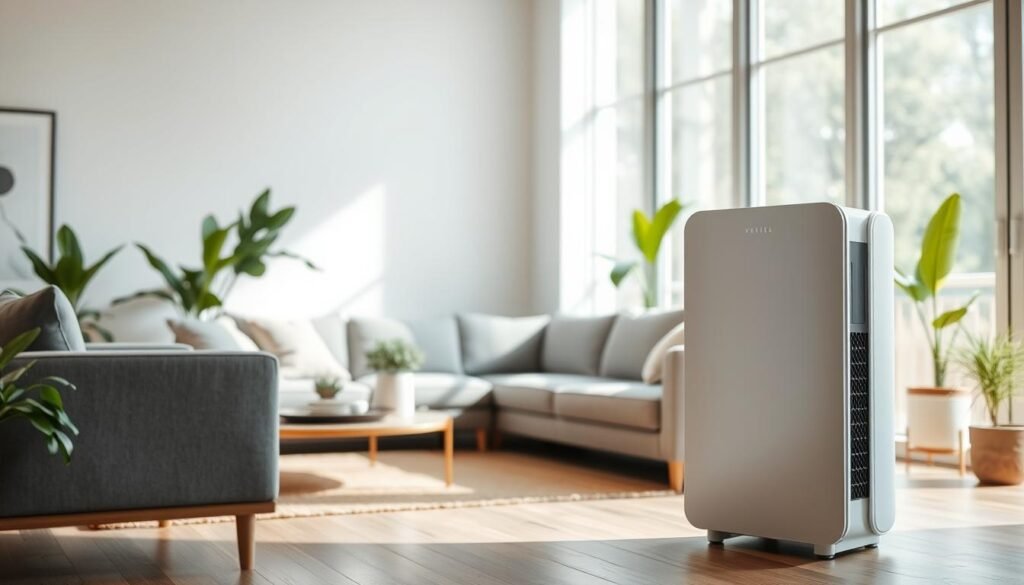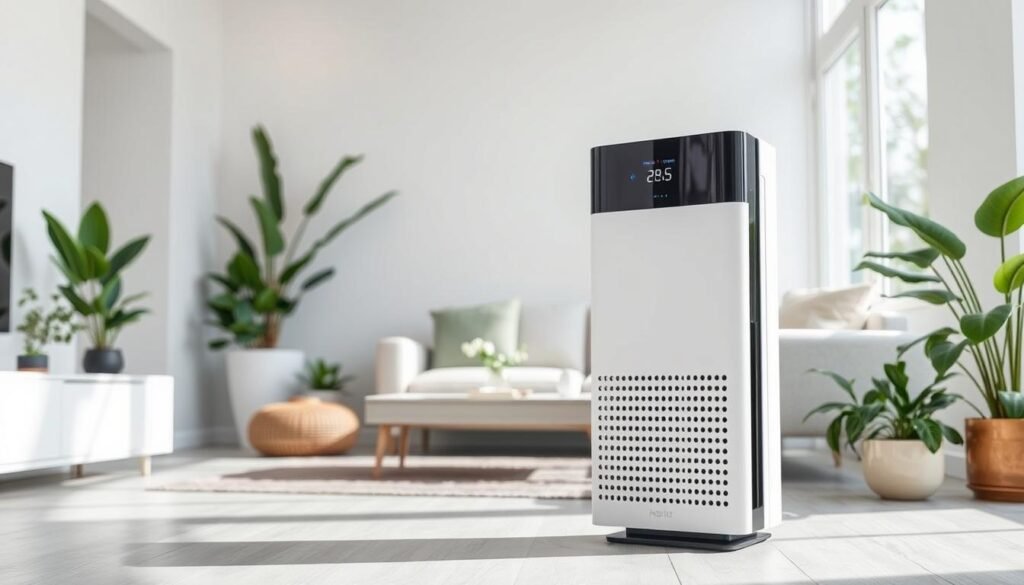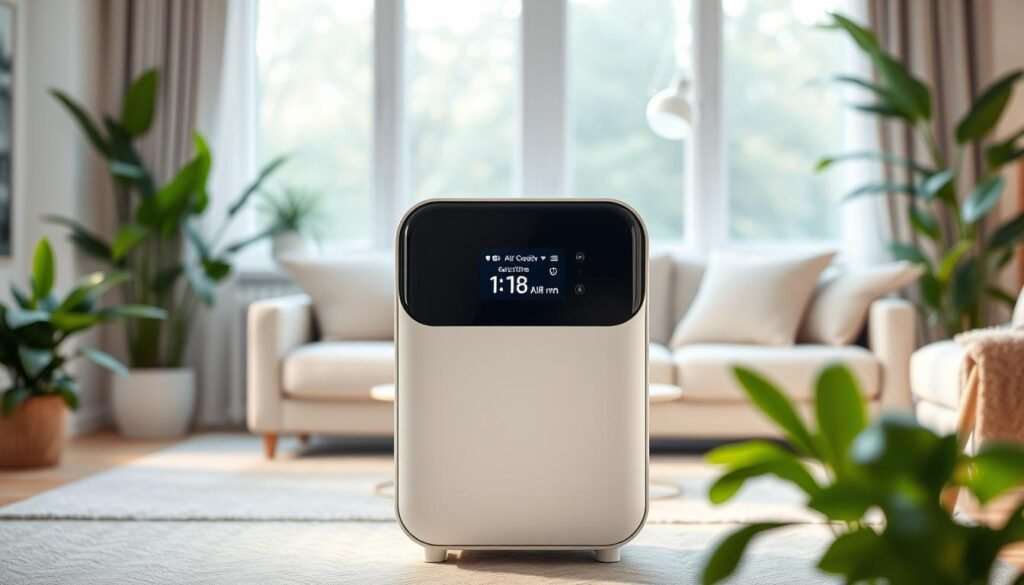In an era where indoor air quality is more critical than ever, ensuring that the air in your home is clean and free of pollutants has become a top priority. With increasing concerns about allergies, respiratory issues, and overall health, investing in a smart air purifier has never been more important. Traditional air purifiers have been effective, but the latest Wi-Fi-enabled air purifiers take things a step further, offering advanced features like real-time air quality monitoring and seamless integration into your daily life. Whether you’re dealing with allergies, pet dander, or pollution, a smart air purifier with a HEPA filter is an investment you won’t regret. Here are 5 reasons why you need one in your home.

1. Advanced Filtration for Cleaner, Healthier Air
At the core of every smart air purifier is its ability to filter out harmful pollutants. These devices typically feature multi-stage filtration systems, including HEPA filters, activated carbon filters, and sometimes even UV-C light or ionizers.
- HEPA Filters: High-efficiency particulate air (HEPA) filters are designed to capture tiny particles as small as 0.3 microns, which includes common allergens like dust, pet dander, pollen, and mold spores. These are among the most effective filters available and can capture up to 99.97% of airborne particles, ensuring that you’re breathing only the cleanest air.
- Activated Carbon Filters: These filters are specifically designed to trap odors, harmful chemicals, and volatile organic compounds (VOCs) like formaldehyde and benzene, which can be released from paints, furniture, cleaning products, and other household materials. They help eliminate bad smells and keep the air fresh.
- UV-C Light: Some smart air purifiers come equipped with UV-C light technology, which helps kill bacteria, viruses, and other microorganisms in the air, providing an additional layer of protection for your health.
The advanced filtration system in smart air purifiers ensures that your home remains free from a wide range of airborne particles, including common irritants like smoke, pet hair, and even harmful bacteria and viruses. This is especially beneficial for individuals who suffer from respiratory issues, such as asthma or allergies.
2. Convenient Control Through Smart Technology
The biggest advantage of investing in a smart air purifier is the convenience it offers. Unlike traditional air purifiers, which require manual adjustments and constant attention, smart air purifiers can be controlled remotely through apps on your smartphone or integrated with smart home systems. With just a few taps or voice commands, you can easily monitor and adjust your air purifier to suit your needs.
- Mobile App Control: Many smart air purifiers come with their own mobile apps that allow you to control the device from anywhere. You can turn the purifier on or off, set schedules, adjust fan speeds, and check real-time air quality readings—all from your smartphone. This means you can adjust the air quality in your home even when you’re not there, ensuring that it’s always clean when you return.
- Voice Control: Smart air purifiers are often compatible with popular voice assistants like Amazon Alexa, Google Assistant, or Apple HomeKit, which means you can control your air purifier hands-free. Whether you’re cooking, working, or relaxing on the couch, simply saying commands like “Hey Google, turn on the air purifier” or “Alexa, increase the fan speed” can make it effortless to keep the air clean.
- Smart Scheduling: Many smart air purifiers come with scheduling features that allow you to set the device to operate at specific times of day. You can schedule the purifier to run while you’re at work or overnight while you’re sleeping. This level of customization ensures that the air in your home remains at optimal quality without you needing to adjust it constantly.
This advanced filtration ensures your home stays free from allergens, smoke, and even harmful microorganisms, making it ideal for those with allergies or respiratory issues.
With these smart features, a smart air purifier provides you with unparalleled control and convenience, making it much easier to manage the air quality in your home. The result? Less time spent fiddling with controls and more time enjoying clean, healthy air.

3. Real-Time Air Quality Monitoring
A major benefit of a smart air purifier is its ability to monitor air quality in real-time. Most of these advanced devices come equipped with sensors that detect the level of particulate matter, allergens, and VOCs in the air. When the air quality drops below a certain threshold, the purifier can automatically adjust its operation to improve the air.
- Air Quality Sensors: These sensors continuously measure the air quality in your home and provide live feedback. This allows you to see the current level of pollution and track changes over time. Many devices feature a color-coded display or app notifications to indicate the level of air pollution (e.g., blue for good air quality, orange for moderate, and red for poor).
- Automatic Adjustment: Once the smart air purifier detects pollutants or allergens in the air, it will automatically increase its fan speed to clear the air faster. This ensures that you always breathe the cleanest air possible without having to manually adjust the device.
- Data Insights: Some smart air purifiers offer detailed insights into the air quality over time, giving you a better understanding of when pollution levels are at their highest. This can help you identify patterns and take preventive action, such as closing windows during high pollen seasons or reducing the use of household chemicals that contribute to VOCs.
By having access to real-time data, you can make more informed decisions about how to maintain the air quality in your home. The automated features of a smart air purifier also ensure that the device is always working at its best, providing you with cleaner air around the clock.
4. Energy Efficiency and Cost Savings
Another important reason to choose a smart air purifier is its energy efficiency. These devices are designed to use energy wisely, which can help reduce electricity costs while still providing effective air cleaning.
- Energy-Saving Modes: Many smart air purifiers feature auto modes or eco modes, which adjust the purifier’s operation based on the air quality in your home. If the air is clean, the purifier will run at a lower speed to conserve energy. Once the sensors detect pollutants, the device will ramp up its operation to clear the air more quickly.
- Smart Power Management: Some smart air purifiers are designed to run at peak efficiency, meaning they use the least amount of energy necessary to clean the air. With the auto-off or sleep mode functions, they turn off when the air quality reaches acceptable levels, saving you money on electricity bills.
- Longer Lifespan: Smart air purifiers are built to last. With their advanced features and efficient operation, they tend to require fewer repairs and replacements over time. Furthermore, many of them have replaceable filters that last longer than traditional filters, which can reduce the frequency of filter replacements.
When you invest in a smart air purifier, you’re not only improving your air quality—you’re also making a long-term investment in reducing your energy consumption and saving money over time.
5. Improved Sleep and Overall Wellbeing
One of the often-overlooked benefits of using a smart air purifier is its positive impact on your health and overall well-being. Cleaner air can significantly improve the quality of your sleep and day-to-day energy levels.

- Better Sleep: Poor air quality can lead to disrupted sleep, especially for individuals with allergies, asthma, or other respiratory conditions. By filtering out allergens like pollen, pet dander, and dust mites, a smart air purifier can help you breathe easier and enjoy a more restful sleep. Clean air ensures that you don’t wake up with a stuffy nose, itchy eyes, or coughing, all of which can disrupt sleep.
- Improved Focus and Energy: Clean air doesn’t just help with sleep; it also boosts your overall energy and concentration. Air pollution and allergens can lead to fatigue, headaches, and brain fog. By maintaining clean air, a smart air purifier can help you feel more energized and focused throughout the day.
- Healthier Environment: In addition to improving respiratory health, removing airborne particles like dust, mold, and smoke can reduce the risk of other health issues, such as headaches, sinus problems, and eye irritation. For those with asthma or other respiratory conditions, a smart air purifier is an essential tool to create a healthier environment at home.
By improving your air quality, a smart air purifier contributes to better sleep, enhanced productivity, and improved health. It creates a space where you can breathe easier and live better, making it a valuable addition to any home.
Conclusion: Why You Need a Smart Air Purifier in Your Home
Investing in a smart air purifier is more than just buying another appliance—it’s an investment in your health, comfort, and overall well-being. These devices provide cleaner air, are energy-efficient, offer real-time air quality monitoring, and integrate seamlessly into your daily routine through smart technology. With features like HEPA filters, activated carbon filtration, smart controls, and real-time data, a smart air purifier ensures that your home remains a safe, healthy space to live in.
From reducing allergens and pollutants to improving sleep quality and boosting your energy, the benefits of a smart air purifier are undeniable. If you’re serious about creating a cleaner, healthier living environment, now is the perfect time to invest in one. With so many options available, you’re sure to find the perfect model to meet your needs. Start breathing easier today with a smart air purifier—your health will thank you!
Frequently Asked Questions (FAQs)
What is a smart air purifier, and how is it different from a regular air purifier?
A smart air purifier is an advanced air cleaning device that uses smart technology to provide more control and efficiency compared to traditional air purifiers. While both types of purifiers use filters (like HEPA and activated carbon) to clean the air, a smart air purifier can be controlled remotely through a smartphone app, voice commands (via Amazon Alexa, Google Assistant), and even automated to adjust its operation based on real-time air quality monitoring. It offers additional features such as real-time air quality tracking, energy efficiency, and scheduling, which are not typically available in standard models.
How does a smart air purifier improve indoor air quality?
A smart air purifier improves indoor air quality by using a multi-stage filtration system to remove airborne particles like dust, pollen, pet dander, mold spores, smoke, and volatile organic compounds (VOCs). The device continuously monitors the air using built-in sensors, adjusting its operation to maintain optimal air quality. Many models also feature activated carbon filters to eliminate odors and UV-C light technology to kill bacteria and viruses, providing a thorough cleaning of the air you breathe.
Can I control my smart air purifier remotely?
Yes, you can control most smart air purifiers remotely. Many models come with a dedicated mobile app that allows you to monitor and adjust your air purifier’s settings from anywhere. Whether you’re at work, running errands, or in another room, you can turn the device on/off, change fan speeds, set timers, and check real-time air quality levels. Additionally, voice control integration with Amazon Alexa, Google Assistant, and Apple HomeKit makes it easy to adjust settings with simple voice commands, adding even more convenience.
Do smart air purifiers save energy?
Yes, smart air purifiers are designed to be energy-efficient. These devices come equipped with features like auto modes, which adjust the operation based on the air quality, ensuring that the purifier runs only when needed. For example, if the air quality is already clean, the purifier will reduce its fan speed or switch to standby mode, conserving energy. Additionally, many smart models offer eco or sleep modes that use minimal power while still providing effective air filtration.
How do I know which smart air purifier is right for my home?
When choosing a smart air purifier, consider factors such as the size of your room, the types of pollutants you want to remove (e.g., allergens, smoke, odors), and any additional features you may need (like HEPA or activated carbon filters). Look for a device that is designed to cover the square footage of your room. Reading customer reviews and checking specifications like filter replacement frequency, noise levels, and energy consumption can also help you make an informed decision. Additionally, some models have air quality sensors to provide real-time data on pollution levels in your home, making it easier to choose the right settings.
